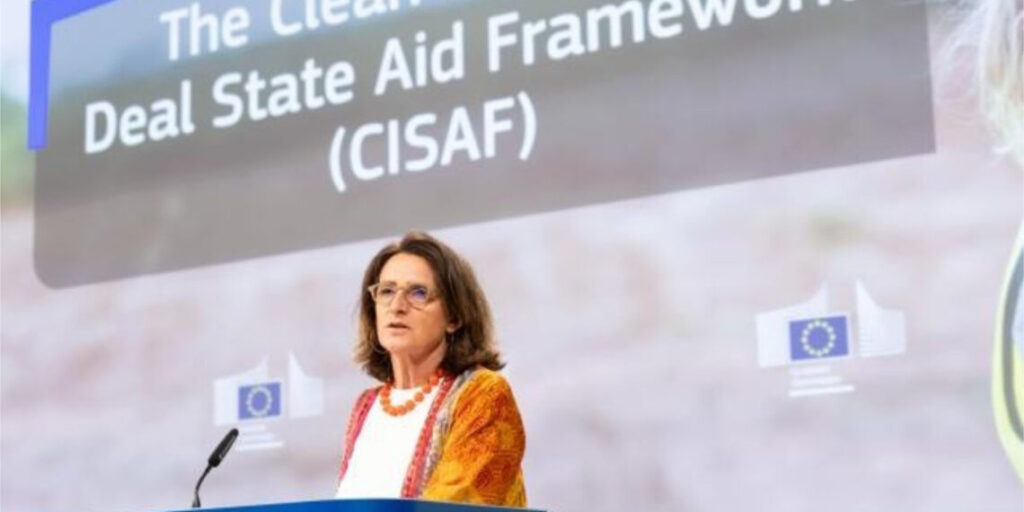Julio García
The European Commission has approved a €700 million Spanish program to support strategic investments that will increase Spain’s clean technology manufacturing capacity, in line with the objectives of the Clean Industry Deal.
As the Commission announced on Thursday, this measure will contribute to the transition to a net-zero emissions economy. The program was approved under the Clean Industry Deal State Aid Framework Agreement (CISAF), adopted by the Commission on June 25, 2025.
The Spanish measure
Spain notified the Commission of a €700 million plan to support strategic investments that will increase production capacity, contributing to the objectives of the Clean Industry Deal.
The objective of this program is to provide aid for investments that increase the production capacity of net-zero emission technologies included in Annex II of the CISAF, as well as for the production of the main specific components of these technologies. The aid will be granted through direct subsidies. The measure will be open to companies throughout Spain and applications can be submitted until December 31, 2028.
The Commission noted that the Spanish scheme complies with the conditions established in section 6.1 of the CISAF. In particular, the aid will incentivize the production of clean technologies, as well as their main specific components.
The Commission concluded that the Spanish scheme is necessary, appropriate, and proportionate to accelerate the transition to a net-zero emission economy and facilitate the development of certain economic activities that are important for the implementation of the Clean Industry Deal. This is in accordance with Article 107(3)(c) of the Treaty on the Functioning of the EU and the conditions established in the Clean Industry Agreement.
On this basis, the Commission approved the aid measure in accordance with EU State aid rules.
On 25 June, the Commission adopted the CISAF to promote support measures in key sectors for the transition to a net-zero emissions economy, in line with the Clean Industry Deal.
The CISAF allows for the following types of aid, which Member States can grant until 31 December 2030 to accelerate the green transition:
- Measures to accelerate the deployment of renewable energy and low-carbon fuels (sections 4.1 and 4.2). Member States may establish investment schemes for all renewable energy sources, as well as energy storage, with simplified tendering procedures. Specific rules are also established to accelerate the deployment of low-carbon fuels.
- Measures allowing for a temporary reduction in electricity prices for energy-intensive users to ensure the transition to clean and low-cost electricity (section 4.5). These measures will help prevent industrial activities from relocating to areas with nonexistent or less ambitious environmental regulations before the decarbonization of the EU electricity system fully translates into lower electricity prices.
- Measures facilitating the decarbonization of industrial processes (section 5). Member States may support investments in the decarbonization of industrial activities to reduce dependence on imported fossil fuels. This can be achieved through electrification, energy efficiency, and the transition to the use of renewable hydrogen and hydrogen generated from electricity that meets certain conditions, with greater potential to support the decarbonization of industrial processes that adopt hydrogen-derived fuels.
- Measures to ensure sufficient manufacturing capacity for clean technologies (section 6). Member States may grant investment aid for projects related to technologies covered by the Net Zero Emissions Industry Act (final products such as batteries, solar panels, wind turbines, heat pumps, electrolyzers, and carbon capture, utilization, and storage systems, including key specific components). This also includes the production and recycling of related critical raw materials.
- Measures to reduce the risk of private investments needed for the deployment of clean energy, industrial decarbonization, clean technology manufacturing, certain energy infrastructure projects, and projects that support the circular economy (section 8).
The Executive Vice President for a Clean, Fair and Competitive Transition, Teresa Ribera, stated that “This program will boost Spain’s clean technology manufacturing capacity by supporting key strategic investments. It promotes the objectives of the Clean Industry Pact, fostering a competitive and sustainable transition, while minimizing potential market distortions.”
